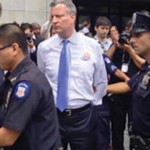Who would have predicted the results of September’s primary election in the doldrums of last summer, when a shape-shifting of Bloomberg into Quinn was all but inevitable?The outcome would have been a double shock if we had known about it then. Not only was it a win for Bill deBlasio but a transcendent moment in New York City elections, a rejection of the usual identity politics based on differences—race, gender, religion, ethnicity, sexual preference—for a victory based on issues, especially the winner’ssignature “Tale of Two Cities,” theeconomic inequality that unites 99.99% of us all. Although the results surprised a lot of people here,they didn’t surprise Ellsworth Chytka out on the Yankton Sioux Reservation in South Dakota. He’ll tell you why in the followingtranscription of a conversation we had last June:
“When I met people in your neighborhood and they found out I was a Yankton it wasn’t even that they were curious. So many of them were polite enough to ask, ‘Native American, is that what you want to be called?’ To me it isn’t what name is used. It’s the energy behind how you’re saying it. When I would go from your apartment building and walk around, wherever I went I never felt less than. There’s places I go out here, I put my hand out to get the change and they drop it into my hand. It’s like they don’t want to touch it because I have some kind of disease, or the skin colors are going to rub off. It’s pretty bad. But I do what my grandma taught me. I turn the other cheek and walk away.
“You can see the world but you don’t see all these people together in one place. Oh, they might have some diversity but not in big numbers like you’ve got in New York, and there they might be living next door to each other while back home they’re fighting like hell—Russians, Chechnyans, Sunni and Shia, whatever. And it’s not just the race and the ethnic or religiousdifferences. Fifty gay people marching and all of a sudden 150 non gay people join them and say, ‘Yeah!’ It’s beautiful. I’m the one that talks a lot about getting along, world peace and that, but in New York where there’s literally every nationality in the world they’re actually doing it. Sure they have differences and stuff but that happens everywhere, but there they have all these different people and they’re not snarling at each other. They’re going about their business, just another human being scurrying along.
“That’s the energy I feel where you live. I don’t get energy from a negative place. Other places you can just feel the prejudice and you get an energy drain. Every now and then I like to pop in for four or five days and just draw in deep on that energy and then say, okay, now I can take off again. You can feel it, you can taste it, it’s in the food—oh yeah—just talking about it I get all fired up. Out here you’ve got a Chinese restaurant but you’ve got some other race in the kitchen making the dishes. The food may taste good but it don’t have the energy. In New York you’ve got native people cooking it and that’s why it’s so delicious. The food they make is who they are. Even in the traffic there’s energy. Out here, three cars go by the gravel road by my farm and it’s a busy day. People might complain but I have all the respect in the world for these drivers, how they manage in and out, so much to learn, just watch and listen. It’s wonderful, what can I say?
“My parting words: I am thankful to New York City for showing the rest of the world something it really, really needs to learn how to do, coexist, and it shows me that the world can do the same thing. What we need to do in this world is say, we’re all people of the earth and we’re all in this together. I miss you, New York, and I miss those mussels with tomato sauce. . . .



